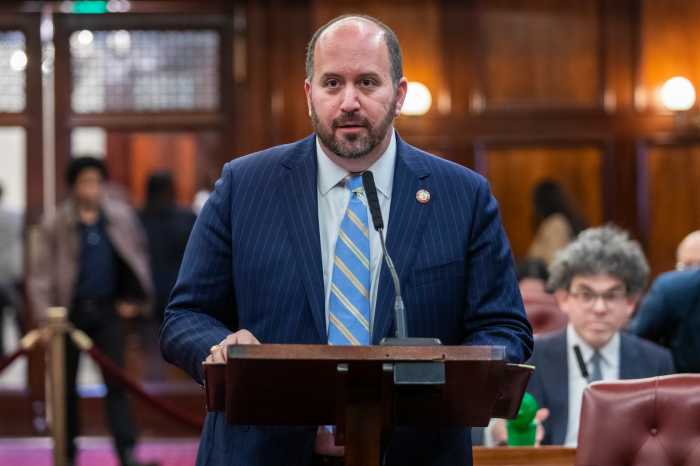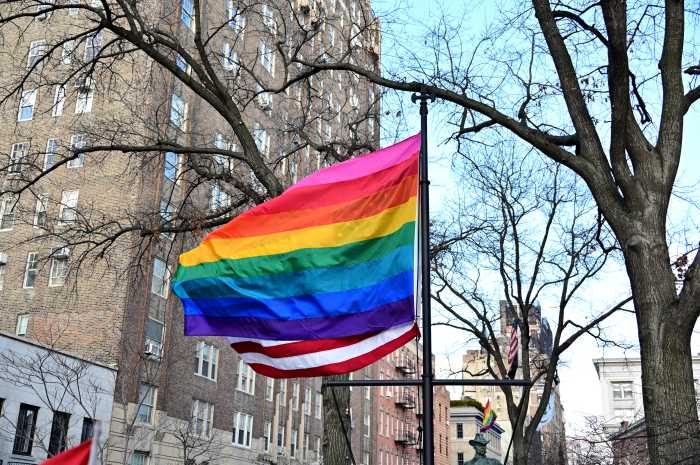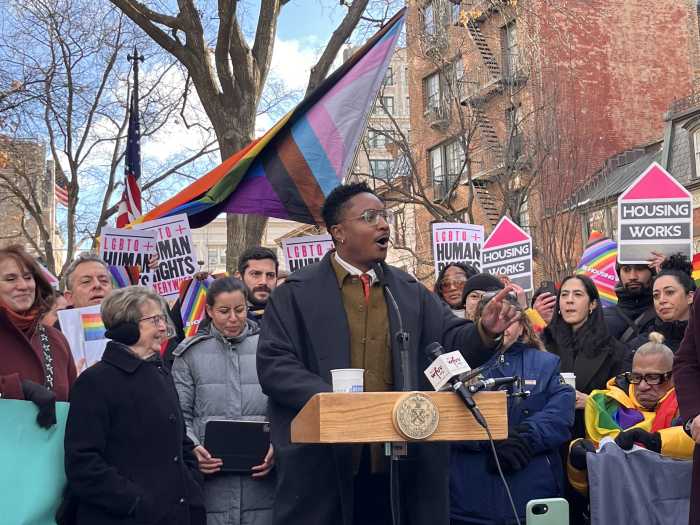Standing alongside the co-chairs of the City Council’s LGBTQIA+ Caucus, dozens of advocates fed up with attacks on gender-affirming care huddled on the steps of City Hall on April 24 and chanted, “When trans rights are under attack, what do we do? Stand up, fight back!”
The rally set the stage for an eventful day at City Hall just hours before lawmakers approved a package of bills intended to protect gender-affirming care across the five boroughs after several hospitals either cancelled appointments or otherwise pulled back on care for youth and some adults in recent months as a result of an executive order signed by President Donald Trump earlier this year.
“We’re not defending an ‘ideology’ — this thing that the right wing puts up in front of us,” LGBTQIA+ Caucus Co-Chair Tiffany Cabán of Queens said during the morning rally. “We’re defending lives, period.”
Ahead of the City Council’s vote to approve those bills, the Council noted that in 2017, the city published an LGBTQ Health Care Bill of Rights stipulating that it is illegal to discriminate on the basis of gender identity, gender expression, or sexual orientation in public accomodations, including healthcare settings, and this past November New Yorkers voted to amend the state constititution to bar discrimination on the basis of gender identity and numerous other areas.
Int. 1201-A, led by Councilmember Shahana Hanif, broadens a person’s private right of action to include gender-affirming care if there is interference with reproductive or endocrine medical care.
Another bill, Int. 1200-A, spearheaded by Cabán, requires the Mayor’s Office of Equity and Racial Justice to offer information on the legal rights and resources available to transgender, gender non-conforming, non-binary, and intersex (TGNCNBI) individuals, such as information on discrimination and harassment based on sexual orientation or gender identity; protections against hate crimes; gender-affirming care access; and more.
A bill championed by another out lawmaker, Chi Ossé of Brooklyn, focuses on protecting trans immigrants: Int. 1203-A requires the Mayor’s Office of Immigrant Affairs to assess the resources available and service gaps for newly-arrived TGNCNBI migrants and create a plan to address those gaps.
Another bill by Ossé (Int. 1204-A) requires the city health commissioner to assess health inequities impacting TGNCNBI individuals and require the health department to create a health agenda for TGNCNBI individuals, including strategies for the department to address the inequities.
Finally, legislation (Int. 246-A) carried by former LGBTQIA+ Caucus Co-Chair Crystal Hudson, who represents a Brooklyn district, requires agencies that provide social services to update their forms to include an “x” gender marker option. Lawmakers also voted in favor of several resolutions calling on the state to step up protections for gender-affirming care, such as by blocking other states from accessing prescription records to protect privacy and safety of medications like abortion pills, hormone therapy, and puberty blockers.
The package of gender-affirming bills clearly served an answer to the president’s Executive Order 14187, which insisted on banning federal funding for gender-affirming care for individuals under the age of 19 and directing the Department of Health and Human Services secretary to “take all appropriate actions to end” gender-affirming care. Soon after, media reports indicated several hospitals — including NYU Langone, Mount Sinai, and New York Presbyterian — had paused care or canceled appointments.
In turn, New York Attorney General Letitia James wasted little time in warning providers that they were obligated under New York State law to provide care without discriminating on the basis of sexual orientation or gender identity, and federal courts on both coasts have blocked enforcement of the order.

Months later, the situation with those providers has not changed, according to a Council spokesperson, and neither NYU Langone nor Mount Sinai responded to Gay City News when asked for clarification about the status of gender-affirming care. Someone with knowledge of New York-Presbyterian’s gender-affirming care program told Gay City News that the hospital continues to care for current patients while working through what they characterized as a developing situation to comply with applicable state and federal laws, though the hospital is open to evaluating new patients.
In contrast, Callen-Lorde Community Health Center, which also offers gender-affirming care, is making it clear that it will not back down from its obligation to provide for its patients. Patrick McGovern, the organization’s CEO, issued a lengthy statement to Gay City News underscoring Callen-Lorde’s “unwavering… commitment to providing the healthcare our patients deserve — care that is affirming, expert, and rooted in dignity,” including gender-affirming care for youth.
Citing state and city laws — and the attorney general’s warnings — McGovern said Callen-Lorde takes “that obligation seriously” and “will never allow politics to dictate the care our patients receive.”
“This work is about saving lives — and we will never back down,” McGovern said.
In addition to Callen-Lorde, other providers, such as New York City Health + Hospitals, are also continuing to provide care. It is not clear how many providers in the city have changed course in the aftermath of the executive order.
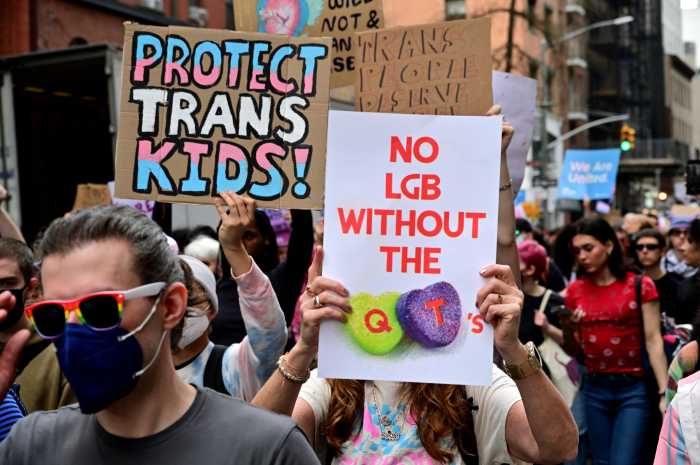
LGBTQIA+ Caucus Co-Chair Erik Bottcher, surrounded by advocates at City Hall before the April 24 vote, acknowledged that he, as a cisgender gay white man, has benefited “so tremendously” from the progress in the fight for LGBTQ rights in New York State. He said it is time to fix the reality that “progress is not shared by all members of our community.”
“I think it is the responsibility of every gay and lesbian and cisgender person to stand up on behalf of our trans siblings,” Bottcher said. “Speak out and stand up on their behalf, because what the Trump administration and the right want to do is they want to split us apart as a community. They want us to turn against each other. They want the gays and lesbians to consider the trans community as a different struggle. We are not going to let that happen.”
He added: “We are not going to let them divide us. We are one community, one movement, and one struggle. We will not rest until we achieve full equality for every member of our community in every corner of every state and every country around the globe. Today is a step in that effort.”
The bills passed overwhelmingly, but every one of them had “no” votes, and four of the bills — Int. 1201, Int. 1203, Int. 1204, Int. 246 — drew a whopping five “no” votes each. The “no” votes for each of those bills came from Councilmembers Joann Ariola, Robert Holden, and Vickie Paladino of Queens, Inna Vernikov of Brooklyn, and Kristy Marmorato of the Bronx. Brooklyn Councilmember Simcha Felder abstained from all of the bills in the package, while another Brooklyn councilmember, Darlene Mealy, abstained from Int. 1201, Int. 1203, and Int. 246. Out Councilmember David Carr of Staten Island, the lone Republican in the LGBTQIA+ Caucus, was absent.
Tensions flared at times during the vote, including when Paladino lashed out in the chamber in response to a comment by Ossé.
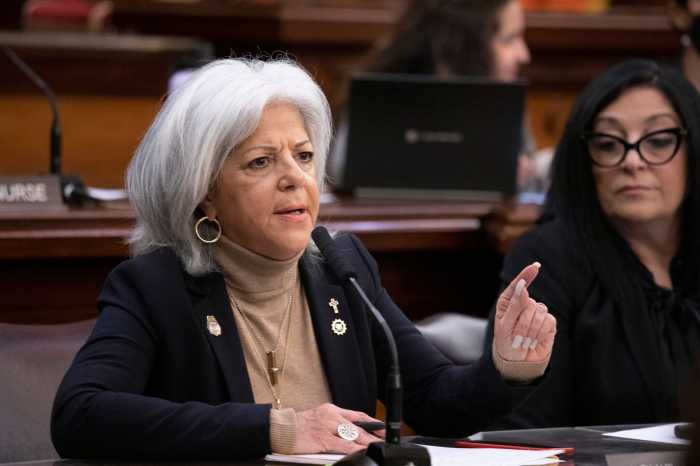
“I personally have not met one trans person who has caused harm to children or anyone for that matter,” Ossé said, before adding that he “has met someone who brought a firearm to a college campus; I have met a person who threatened people’s lives on Twitter…”
Paladino, who boasts a long record of voicing blatantly anti-LGBTQ rhetoric on X, lashed out in response and was immediately chastised for being out of order.
“To keep attacking somebody for their beliefs, one way or another, just does not work,” she said. “So how dare you? How dare you?”
She added: “This is not personal. This is just the way it is. Enough is enough.”


